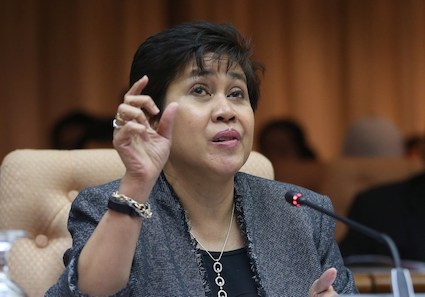Malaysia can weather the storm – BNM Governor

(BERNAMA) – Various measures announced recently underscores Malaysia’s multi-pronged approach that will help the country to endure and recover from the economic impact of COVID-19 pandemic, Bank Negara Malaysia (BNM) Datuk Nor Shamsiah Yunus said.
Complementarities between monetary, financial, fiscal and structural policies are key to ensure policy responses are comprehensive and coordinated effectively, she said.
“The Malaysian economy managed to recover quickly from past crises partly because these policies were implemented collectively in a timely manner,” she said in the Economic and Monetary Review 2019 (EMR) released by Bank Negara Malaysia (BNM) here, today.
In the maiden EMR report, Nor Shamsiah acknowledged that global health crisis due to COVID-19 has resulted in the pace of economic activities in many countries contracting sharply and growth prospects for both advanced and emerging market economies are deteriorating.
This, in turn, has led to heightened turbulence in global financial markets, further amplified by uncertainty in the global oil market.
Malaysia has not been spared.
While relevant authorities and frontliners are doing their best to mitigate the spread of the virus, the economic impact is already being felt deeply by households and businesses alike, she said.
“Spillovers from the pandemic and the implementation of the Movement Control Order (MCO) to contain its spread will result in large output losses for the Malaysian economy in 2020.”
“Significant policy intervention to support individuals, households and businesses are needed to prevent what should be a transitory economic disruption from becoming permanent.”
Such support should aim to avert large-scale business failures that could result in a more lasting impact on the economy, even after the health crisis has receded, said the governor.
In Malaysia, besides the government’s RM250 billion “Prihatin Rakyat” Economic Stimulus Package 2020, BNM, banking and financial sector, as well as state governments, have also come up with respective measures within their purviews.
For instance, BNM lowered the Overnight Policy Rate (OPR) in January and March this year, by a total of 50 basis points. In addition, the Statutory Reserve Requirement (SRR) ratio was lowered by 100 basis points, with an allowance provided for Government Securities to be recognised for SRR compliance.
These combined SRR measures will release approximately RM30 billion worth of liquidity into the banking system. A 6-month moratorium has also been extended for loan and financing payments.
She said the government’s stimulus measures and policy rate cuts coupled with the continued progress of public projects and higher public sector expenditure would support growth.
The stimulus package alone would contribute 2.8 per cent to growth, she said, but noted output loss due to COVID-19, MCO and commodity supply disruption, the overall growth for the year is expected to be between -2 to 0.5 per cent.
In 2019, Malaysia’s gross domestic product grew by 4.3 per cent.
“As we look into the future, it is important to maintain a sense of perspective. While our current circumstances seem grim, the Malaysian economy retains a degree of resilience.”
“Our diversified sources of growth and external trade structure help to mitigate the economic impact of domestic and external developments,” she said.
Nor Shamsiah said continued surpluses in the current account, adequate levels of international reserves and a flexible exchange rate also accord some buffer against external shocks.
The financial sector remains a source of strength, giving assurance that financial intermediation will carry on uninterrupted, she stressed.
“It is my hope that, in the next EMR, we will be able to note that the global the community has overcome this health crisis and report on how Malaysia has weathered the storm.”
For now, difficult choices must be made for the nation to come out stronger on the other side.
“We will all need to persevere and come together for the sake of our collective future. We have done this before, and I do not doubt that we can do it again. On our part, the Bank will remain steadfast in discharging our mandates through this challenging and unpredictable time,” she added.

